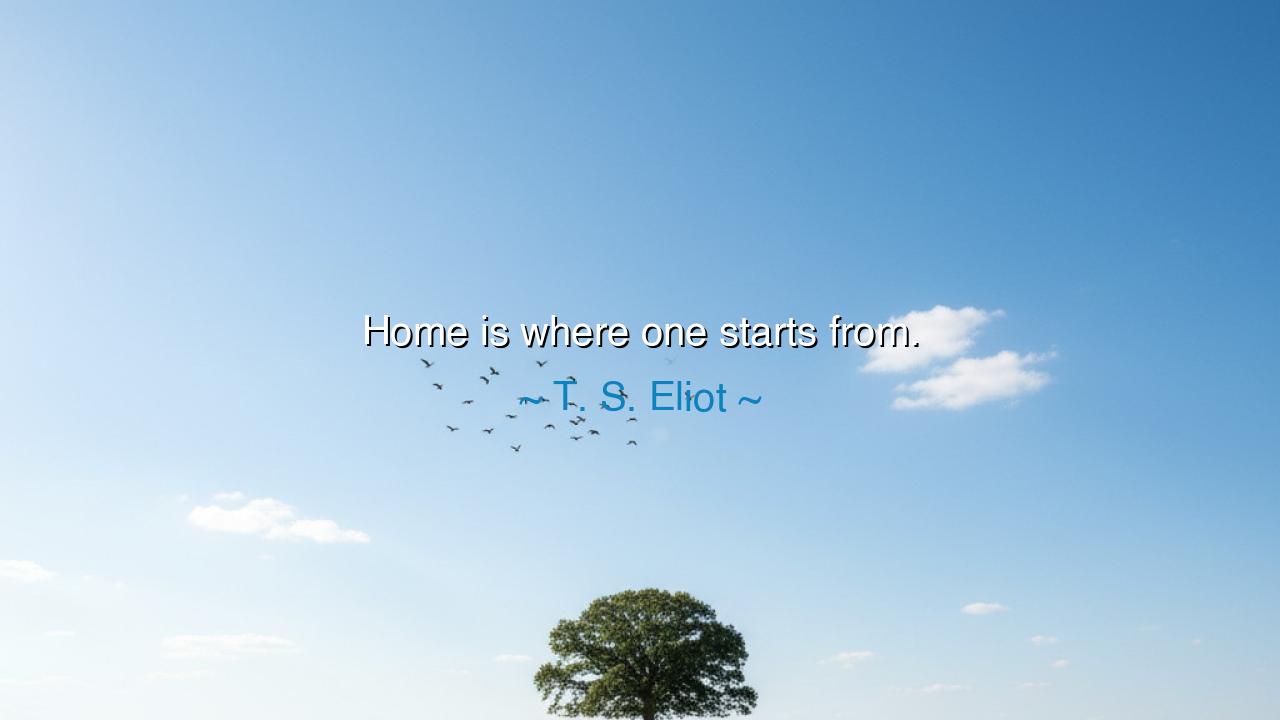
Home is where one starts from.






“Home is where one starts from.” Thus wrote T. S. Eliot, the poet of time and eternity, whose words flow like quiet rivers through the soul. In this simple yet profound line, drawn from his Four Quartets, Eliot captures the sacred truth that home is not merely a place of dwelling, but the origin of all becoming. It is the cradle of memory, the first garden of the heart, the soil from which the spirit rises to meet the world. Every journey, every striving, every act of discovery begins there — in that still, familiar place where love, identity, and belonging are first sown.
Eliot’s vision of home is not sentimental, but spiritual. He does not mean only the brick and mortar of childhood, but the inward center — the first formation of the soul. The home, to him, is the fountainhead of meaning, the still point from which motion takes its direction. The wanderer, the scholar, the artist — all depart from this beginning, whether in peace or in rebellion. It is from home that one learns both the tenderness of safety and the ache of longing. The journey of life, therefore, is not to escape home, but to understand it more deeply — to carry its flame through the winds of time, and one day return to it, wiser and more whole.
To the ancients, too, the idea of home was sacred. The hearth, tended by fire, symbolized not only warmth but the living heart of civilization itself. In every Greek city, the flame of Hestia, goddess of the hearth, was never allowed to go out. Even when colonies were founded far across the sea, they carried coals from the mother flame to light their new fires. Thus, the home was both origin and continuity — a beginning that traveled with you wherever you went. So too, Eliot’s words remind us that though we leave the physical home behind, its essence burns within us, guiding the way like a secret star.
Consider the story of Odysseus, the eternal wanderer of Homer’s Odyssey. For twenty years he journeyed across oceans, through storms and sorcery, through temptation and despair. Yet in every trial, his compass was the thought of Ithaca, his home. It was not merely the land he longed for, but what it represented — his identity, his family, his humanity. Though he became wise and scarred, he remained bound to that origin. And when at last he returned, he found that the home he sought was both the same and transformed — as he himself was. Such is the nature of the journey that Eliot describes: we begin at home, we wander far, and through that wandering, we rediscover the meaning of our beginning.
But Eliot’s insight carries a deeper whisper still. To say that “home is where one starts from” is also to accept that home is not the end. We cannot remain children of the hearth forever. To grow is to depart. The fledgling must leave the nest; the mind must question its own teachers. For only in leaving do we learn what it means to belong. Yet the wise never truly abandon home — they carry its lessons in their hearts. In every stranger’s kindness, in every memory of warmth, the soul recognizes a piece of that first love. Home, then, is both the ground we leave and the heaven we seek — the eternal circle of departure and return.
Eliot himself, a man of profound introspection, lived this truth. Born in America, he wandered to England and made it his home. Yet throughout his life, his poetry carried the pulse of displacement and return — the sense that home is never wholly behind or ahead, but within. His words are not a lament for lost comfort, but a hymn to the journey of the soul — a recognition that every step forward is also a step back toward the beginning. For in the end, all striving leads us home again, not to the house of childhood, but to the quiet understanding of who we truly are.
Lesson: Cherish your home, not as a prison, but as a root. Let it give you strength to grow, courage to wander, and wisdom to return. Remember its lessons of kindness, patience, and belonging, for these are the compass points that will guide you through the wilderness of the world. Build homes not only of stone, but of love — homes that others may carry in their hearts long after they leave your door.
So, remember the teaching of T. S. Eliot: though life may lead you far from the place you began, the path of your becoming always points back to your origin. Home is where one starts from, but it is also where one arrives — transformed, redeemed, and at peace. For in the great circle of existence, every ending is a return, and every return is a beginning once more.






AAdministratorAdministrator
Welcome, honored guests. Please leave a comment, we will respond soon